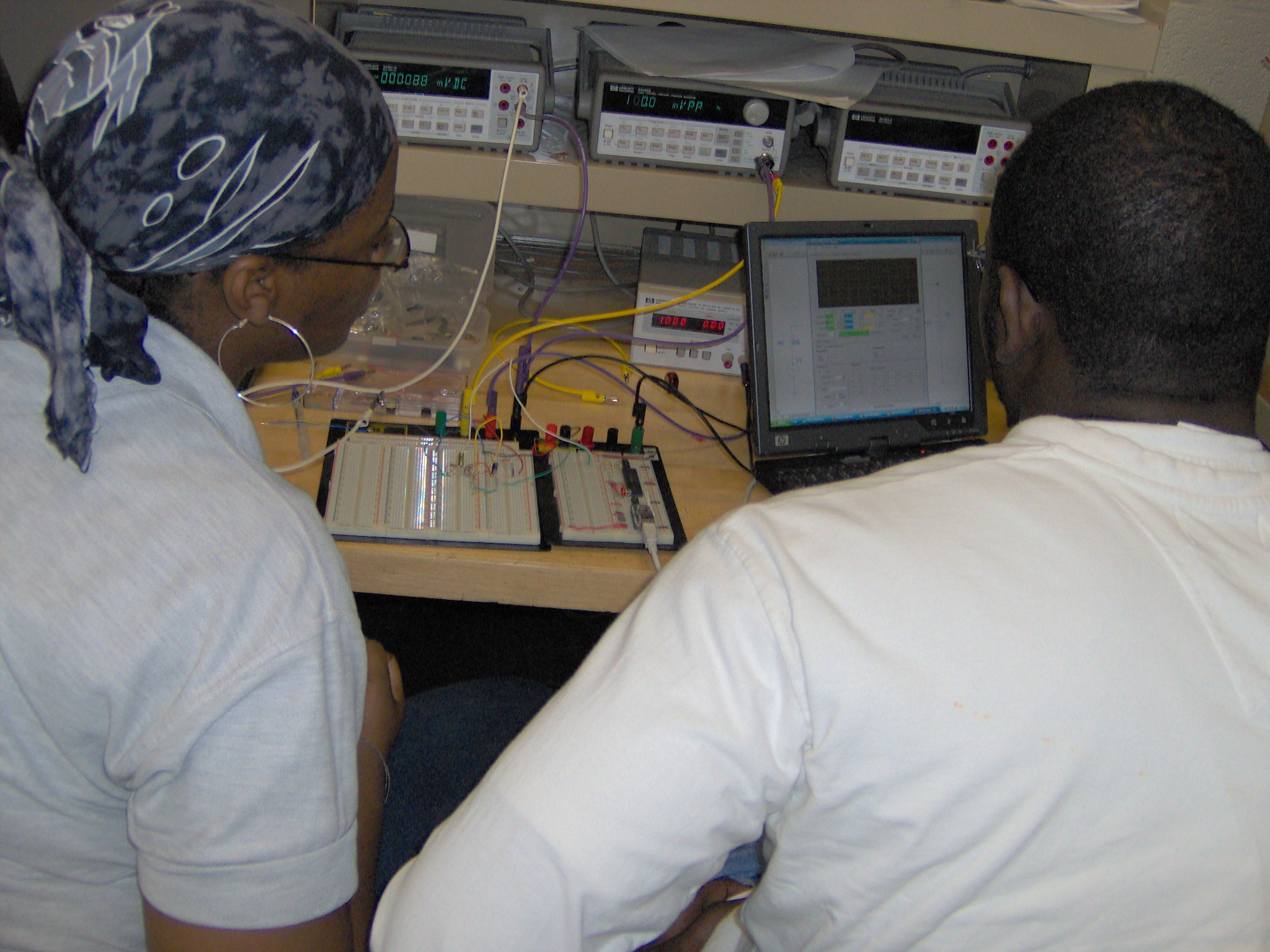- This web site
is maintained by Dr. Charles Kim, PI of the project
-
"My teaching philosophy
with Mobile Studio is to provide greater
flexibility in student learning such that
students can learn using mobile technology in any
physical environment, no longer restricted by
facilities or special equipment. The motto is
'lecture in lab, lab in lecture,anywhere any
time'" -Charles Kim
Project:
"Mobile
Lab Classroom for Minority Students at Howard University"
In
March 2005, Howard University received an HP Technology for
Teaching grant to encourage the transformation of learning and
teaching. We are using HP mobile technology to create a mobile
learning environment which eliminates the boundary between
lecture and lab, theory and application, and of facility
limitation in the student learning. The "anywhere anytime" mobile class
pedagogy, realized with HP Tablet PCs, wireless routers, and
measurement software is currently applied to a few courses and
have been enthusiastically accepted by students.
WHY
MOBILE LAB ?
Most
core electrical and computer engineering courses are taught along
with accompanying laboratories. Lectures and labs are taught
sometimes by different instructors at separate times. In other
words, theories and applications and simulations and
implementations are separately taught. Great are the need of
combining two components together and the demand of synergy
learning in which introduction of a theory and
verification of the theory are possible and instant in a conducive
learning environment. In addition to the need and the
demand, there is a practical barrier to break in the current
laboratory system: facility limitation and time of use
restriction. Traditional labs are to be equipped with
work benches and expensive instruments, and students have to come
to the the physical facility to perform an experiment, where the
access is often denied after hours.
Our
project, motivated to meet the need and the demand and to lift
the barrier of the conventional laboratory limitation, seeks to
develop a mobile studio class using wireless enabled Tablet PCs.
For the data acquisition software and its interface, which
substitute laboratory equipment, our collaborator at RPI was
generous enough to provide the laboratory software
"scope" and the USB interface between the Tablet PC and
students' breadboards.
In
Fall 2005, two classes adopted the mobile studio approach. In
Electronics I class, students experienced exciting moment of
theory, simulation, followed by circuit implementation and
testing and measurement, using only a Tablet PC. The
"Scope" enabled measuring and display of the result. In
Microcomputer course, students had an instant access to the
lecturer's material and the writing pad of the Tablet PC supplied
much better explanation board for the lecturer, further
augmenting students learning.
An
initial survey conducted by a collaborator in the Education
Department was very encouraging. Overall, the students expressed
very positive attitudes regarding the mobile studio approach in
their courses. The students rated the mobile studio class
as quite favorable in terms of increasing their ability to apply
theory, knowledge of subject matter, and interaction with other
students in the course.
IMPLEMENTATION
OF MOBILE LAB
This
technology-rich environment can only be available by utilizing
and connecting computer, wireless communication,
microcontroller-based interfacing, and Windows based data
acquisition and graphic display software. The hardware part of
the system consists of HP Tablets PCs equipped with wireless
communication, a wireless router, and an LCD projector, all
provided by the HP grant. Additional hardware component is a USB
connected interface board which measures signals in an experiment
circuit and sends the measured value to the Tablet PC via USB
connection. The current USB interface is installed in a small
breadboard, and the rest of the board is large enough for most of
the experiments in the course. The measuring and displaying
software, which replaces the conventional oscilloscope and
digital multimeter, was developed and provided by RPI. This
Windows based software can read multi-channel signals with
accuracy and real time.
MOBILE LAB
PEDAGOGY
Mobile
studio pedagogy has two essential components: combination of
theory and application and extension of classroom to
"anywhere anytime." A lecture and lab pair, for example
Electronic I and Electronics I Lab, which has been separately
taught in a classroom for the lecture part and in a laboratory
for the lab, is now taught in any room. Currently, a lab space is
used for the mobile studio class, it is not necessary. Any
place with tables and wireless access can now become a classroom.
In Microcomputer
Fundamentals course for assembly language programming, students
are provided on their wireless networked Tablet PCs with
multi-stream of lecture materials through lecture note web pages,
slides in the screen, additional drawings and explanations
written and displayed on the writing board of the lecturer's
Tablet PC. This dramatic change and quick realization of the
mobile studio pedagogy was only possible by the help from our
collaborators in RPI. Their expertise and experience opened our
eyes on the new pedagogy of engineering teaching, and they helped
us launch, before applying for a HP Technology for Teaching
grant, two demonstration events of mobile studio class. The
experience gained from the demonstration propelled us to easier
deployment of the wireless environment with the HP grant and to
smoother transition to the mobile studio pedagogy.
IMPACT ON
TEACHING and LEARNING
The
purpose of the project is to develop a mobile studio to provide
students with a conducive and synergistic learning environment.
For a teaching perspective, it also involves the improvement in
the betterment of conveyance of knowledge. Lecturers are excited
by the enable technology of Tablet PC and its writing table. A
simple and fixed slide now can become just a template of a more
dynamic teaching material with instant drawings, scribbles, and
additions. We envision, with full deployment of the mobile studio
in a wider range and a broader exposure, that more lecturers join
us in this exciting teaching environment. For an effort to
disseminate the benefit of the mobile studio, we held an
open house in November 2005 for Howard faculty.
The
eventual goal of the project is to improve the learning of the
students and the betterment in conveyance of knowledge. The
deployment of a mobile studio class does not solve every problem
the engineering education faces. However, the alienation of
application from theory and out of steps in lecture and lab of
the traditional learning are slowly receding. Currently students
learn knowledge with multi-faceted streams of lecture, circuit
design, simulation, experiment, and output visualization. We
envision, in the near future, we deploy the mobile studio
pedagogy in a wider net with a Tablet PC to every student in our
department so that all the lecture-lab classes are benefited by
this "any place any time" learning environment.
An initial survey
conducted by a Howard collaborator in Education Department for
Electronics I and Microcomputer courses showed very encouraging
results. The survey showed that the students expressed very
positive attitudes regarding the mobile studio classes in their
courses. The students rated as quite favorable in terms of
increasing their ability to apply the theory, knowledge of the
subject matter and interaction with other students in the course.
We plan to collect more data for summative assessment of the
mobile studio class, and at the end of the project, we will
perform formative assessment on the project.
QUOTES OF THE STUDENTS
- Chimaobi M. - I
appreciated the opportunity of using Table PC‘s for
the first time and implementing a filter circuit and
listening to the output in one arrangement.
- Fanta S. - I feel that I have some
connection between analysis of frequency selective and
real world.
- Colin T. - This kind of learning
environment stimulates interest and encourages deeper
understanding of the circuit and it's applications.
- Daniel E. - Prior to this class and
project, I had no idea how frequency selective circuits
worked. Now, however, whenever I'm operating an appliance
like a CD player or radio and making adjustments to the
treble, bass, etc., I can actually picture what's going
on in the circuit, which gives me a sense of joy as an
aspiring engineer.
- Knia T. - The Mobile Studio was very
interesting and I liked the fact that we were able to see
exactly how real life things come into play regarding
Electrical Engineering.
- Keisha D. - I learned about the basic
application of the theory of inductance and capacitance
and its uses in an everyday system, including an electric
guitar.
- Andrew P. - The fact that we got a
hands-on interaction with the concept being taught was
most appealing to me.
- Dika O. - I would definitely like to
see more of the lecture and lab combinations without
heavy equipment. You could do the lab anywhere.
- Rene H. - I liked the fact that the
class provided the students with an interactive display
of the theory.
- Alex C. - The thing I enjoyed most
about the studio lab was the ability to integrate all lab
instrumentation into one digital center and the
possibility of performing labs outside of the lab
setting.
MOBILE LAB IN
ACTION in Network Analysis I -Spring 2006
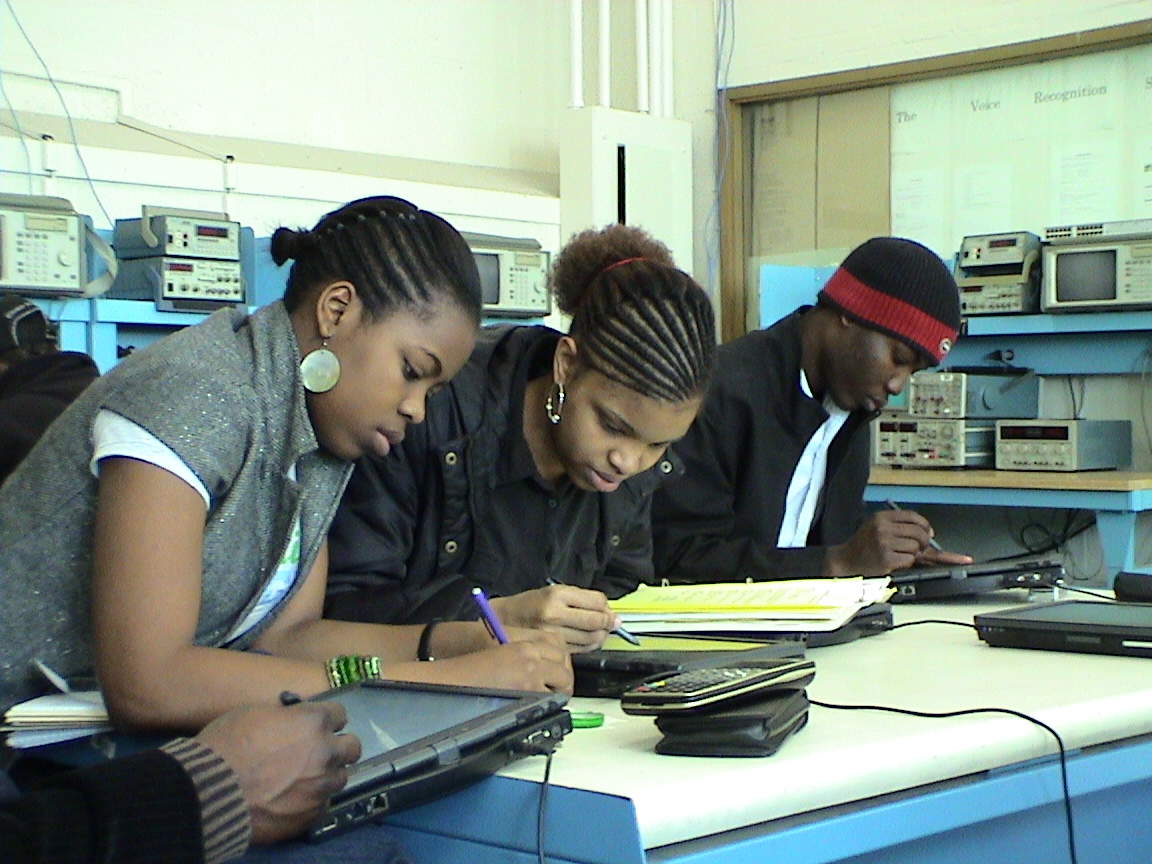
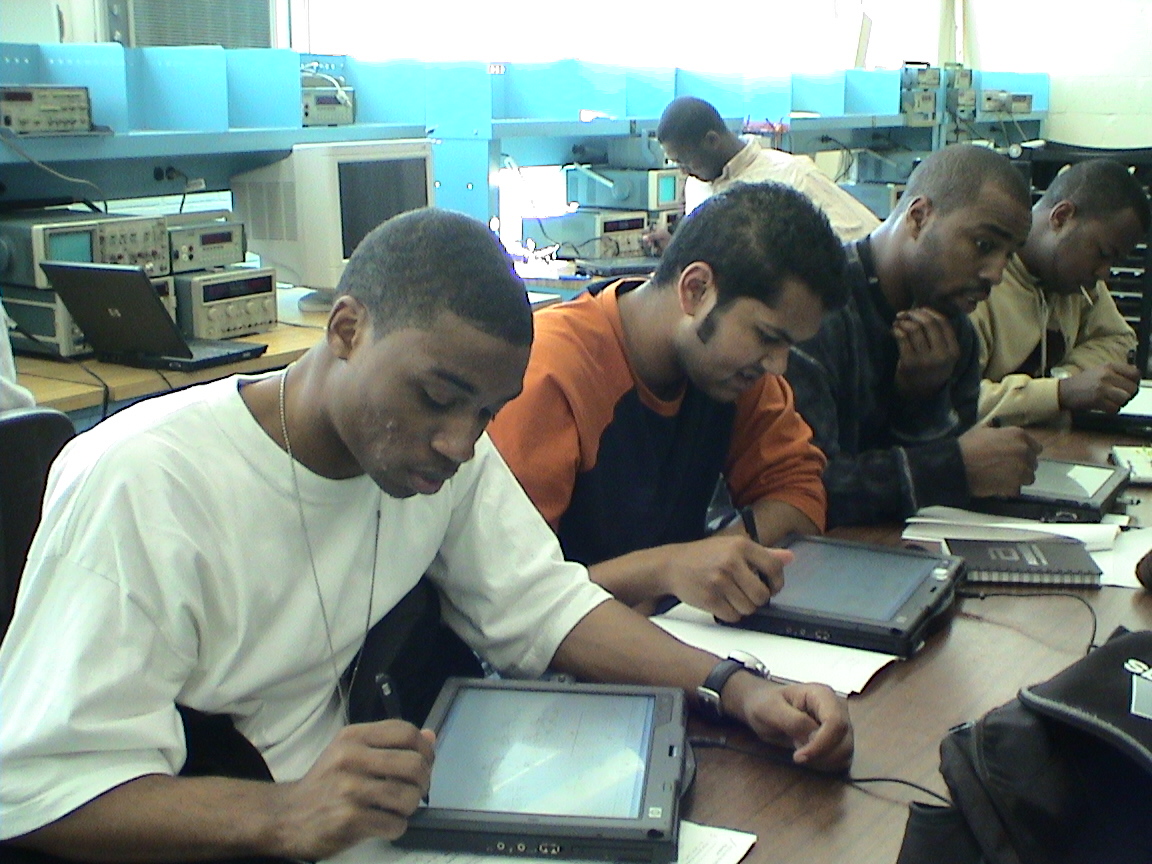
- Oluwafemi
Akintilo and Nia Bradley are working together while
Tolulope Onibiyo is mightily serious about solving a
circuit problem.(Left). Hitting their Tablet PCs
are, from left to right, Kayson Palmer, Pameshanad
Mahase, Hassan Disu, and Nnaemeka Amazu. Obafemi Oteleja
is working at the back (Right).
-
- More Photos: 1, 2, 3, and 4.
MOBILE LAB IN ACTION in MICROCOMPUTER CLASS
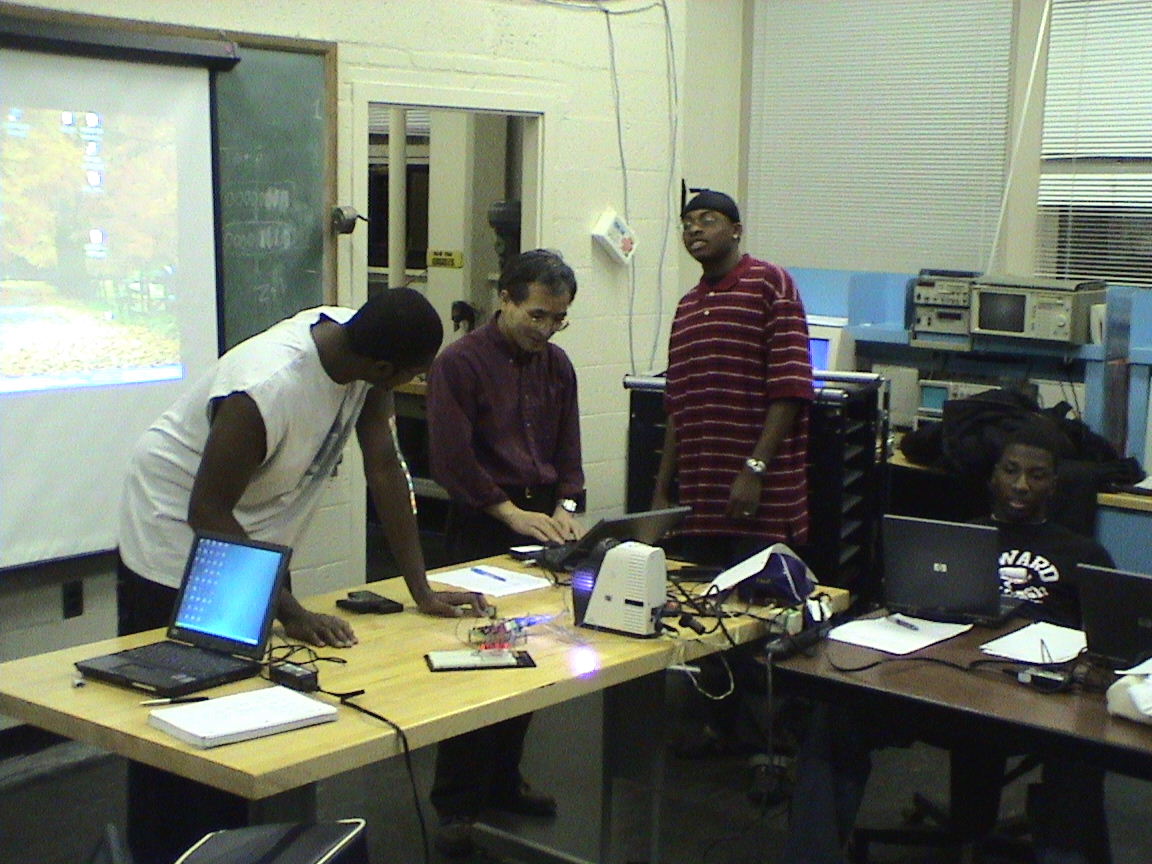
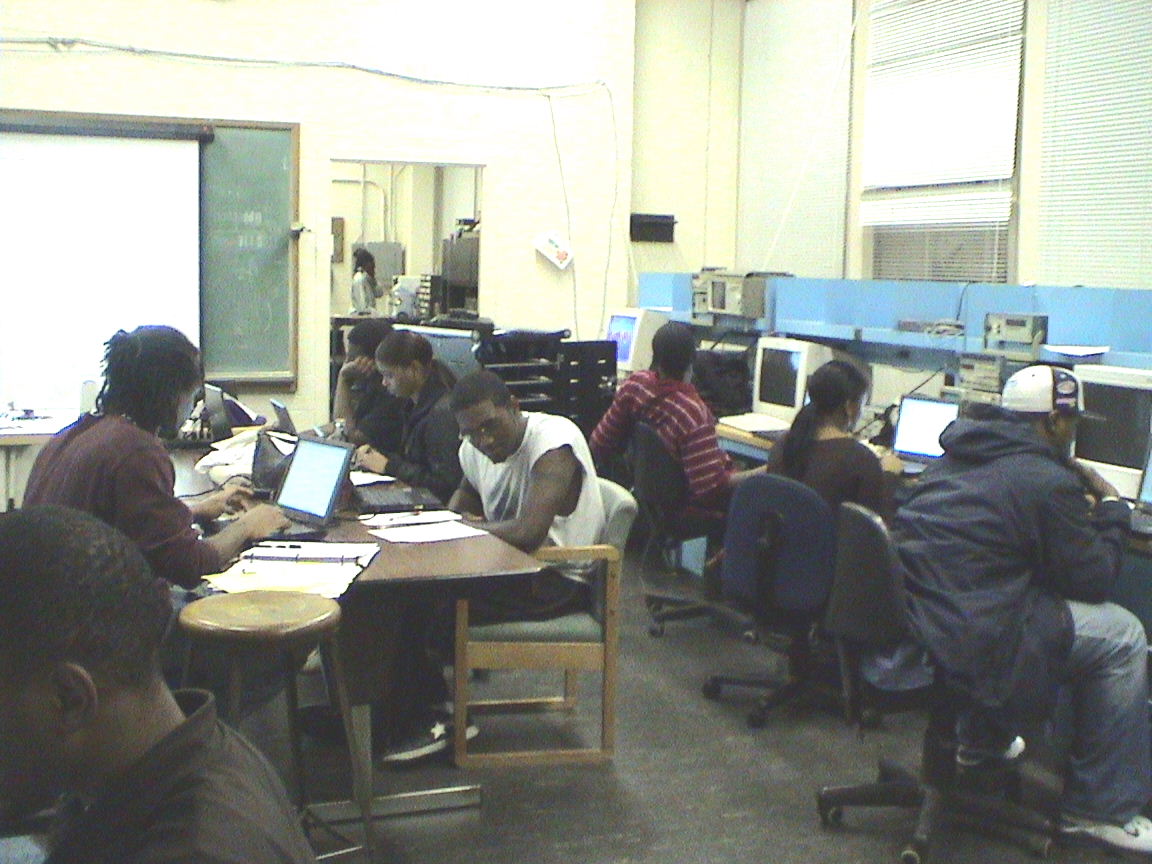
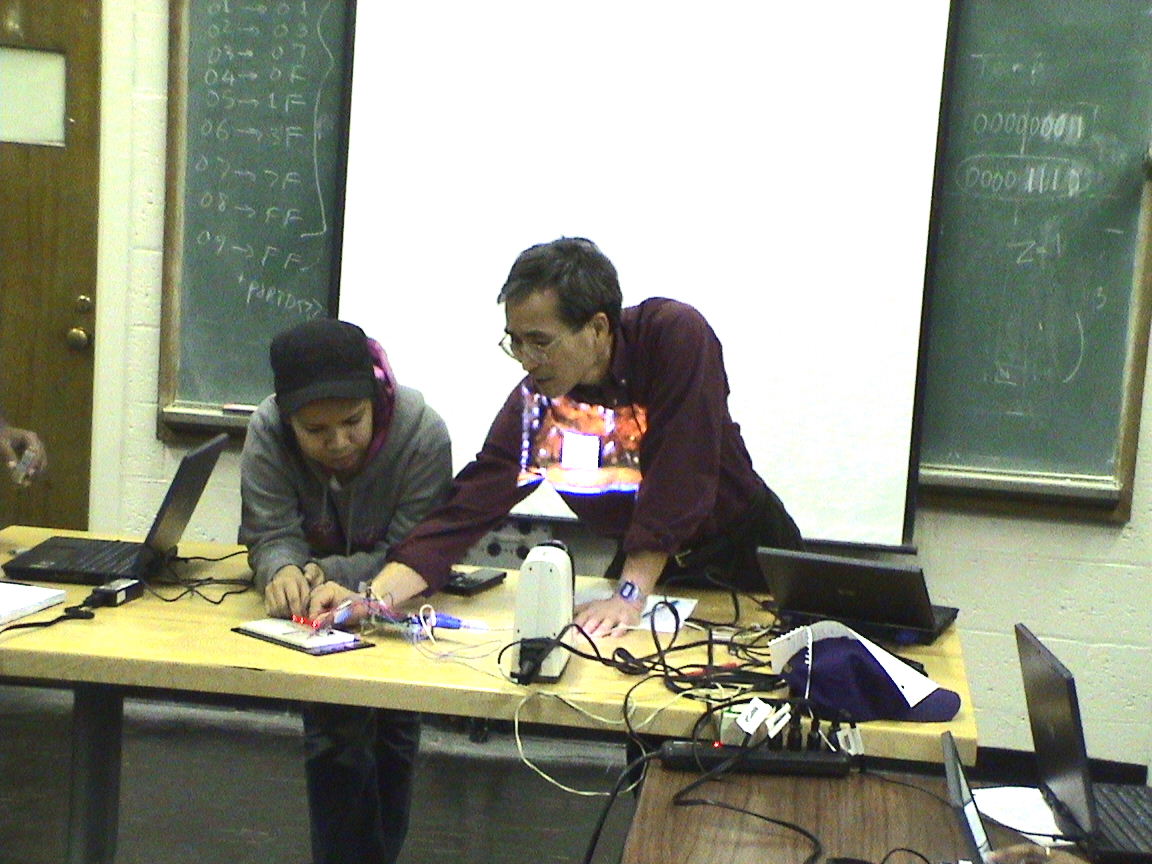
- Dr. Kim is testing Francis Sammy's
assembly code for IR remote contrller decoder while
Andrew Barnor is anxiously waiting for his turn hoping
his code turns OK (Left). Students, each with a
Tablet PC with instant class material access in sweating
with their codes (Center). Annushka Chin Fong
and Dr. Kim are testing Annushka's code (Right).
MOBILE LAB IN ACTION IN NETWORK ANALYSIS II -- PROJECT DEMONSTRATION
- Students in Network Analysis
II used the Mobile Studio in their project demonstration.
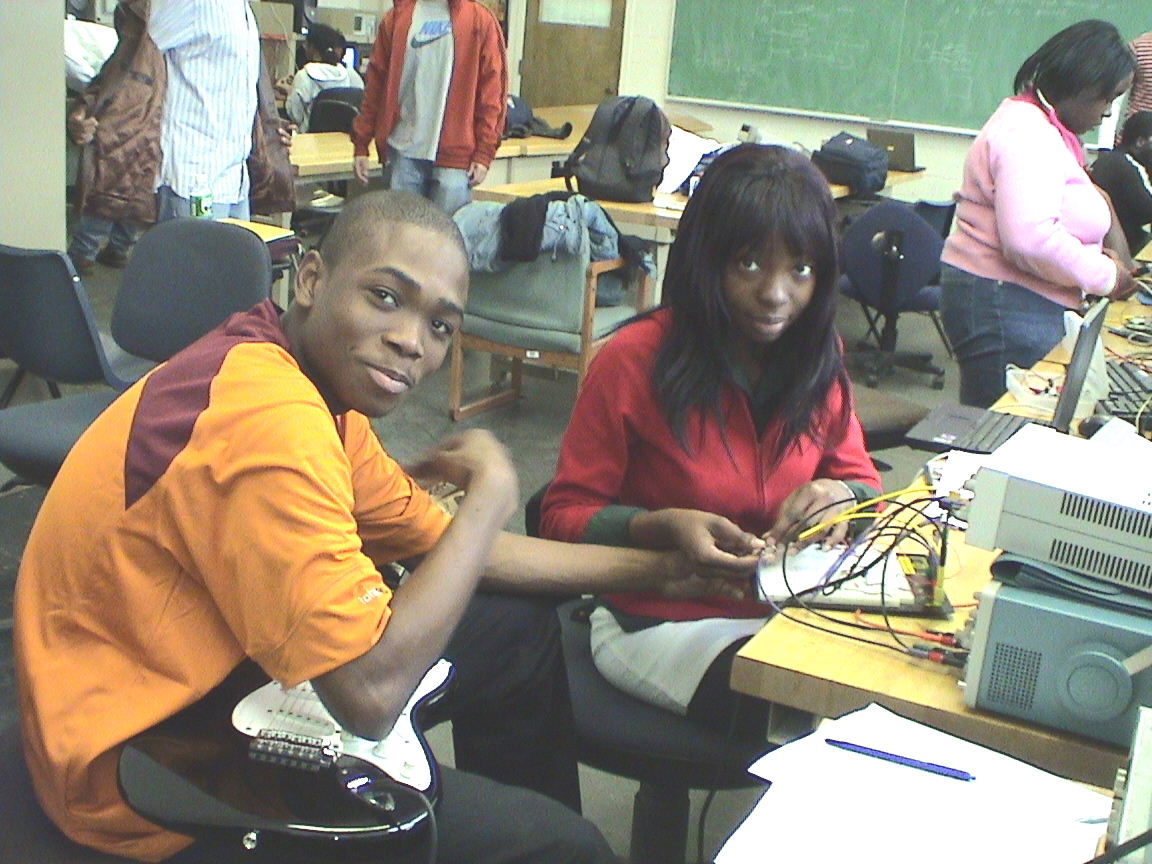
.JPG)
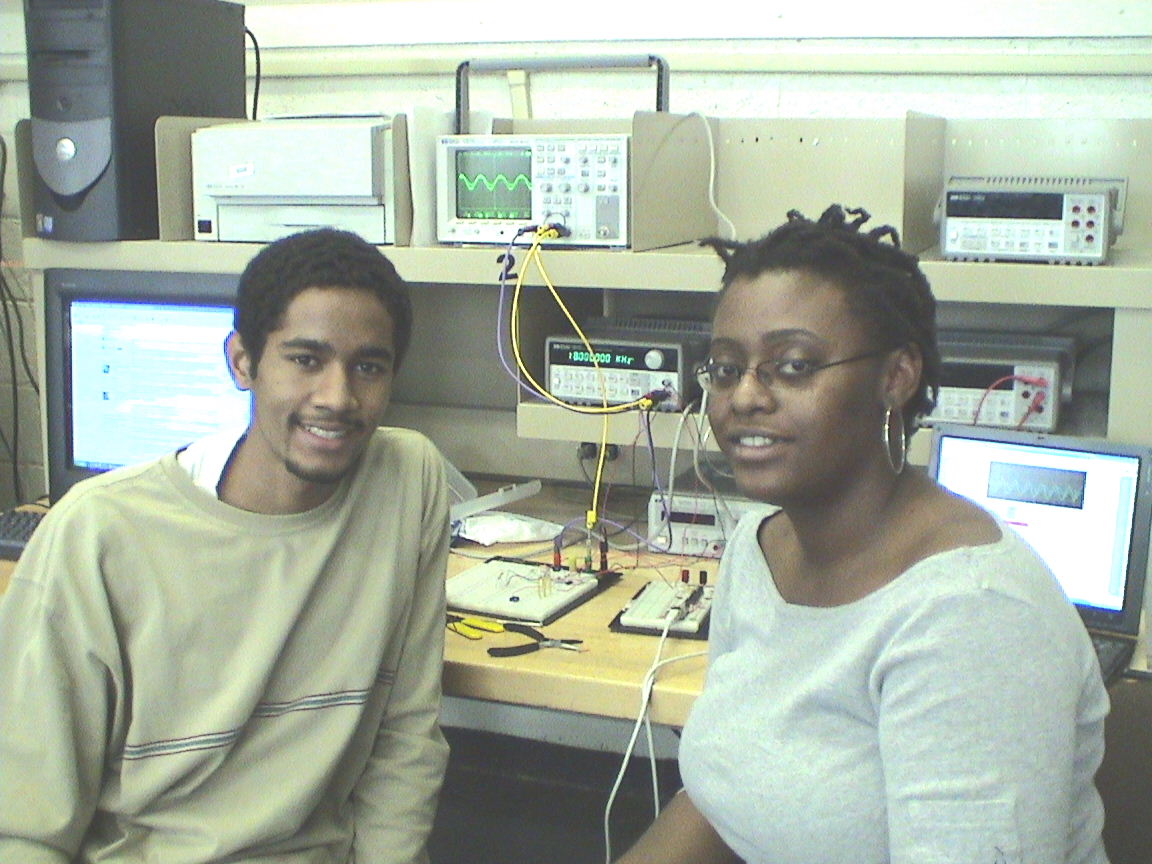
- Korede and Akinsani (Left)
and Chrystal Toney (Center)are in final touch
for their treble volume control projects. Rene Holder and
Keisha D'Anaurd posed after finishing their successful
demonstraion of the project (Right).
MOBILE LAB OPEN HOUSE
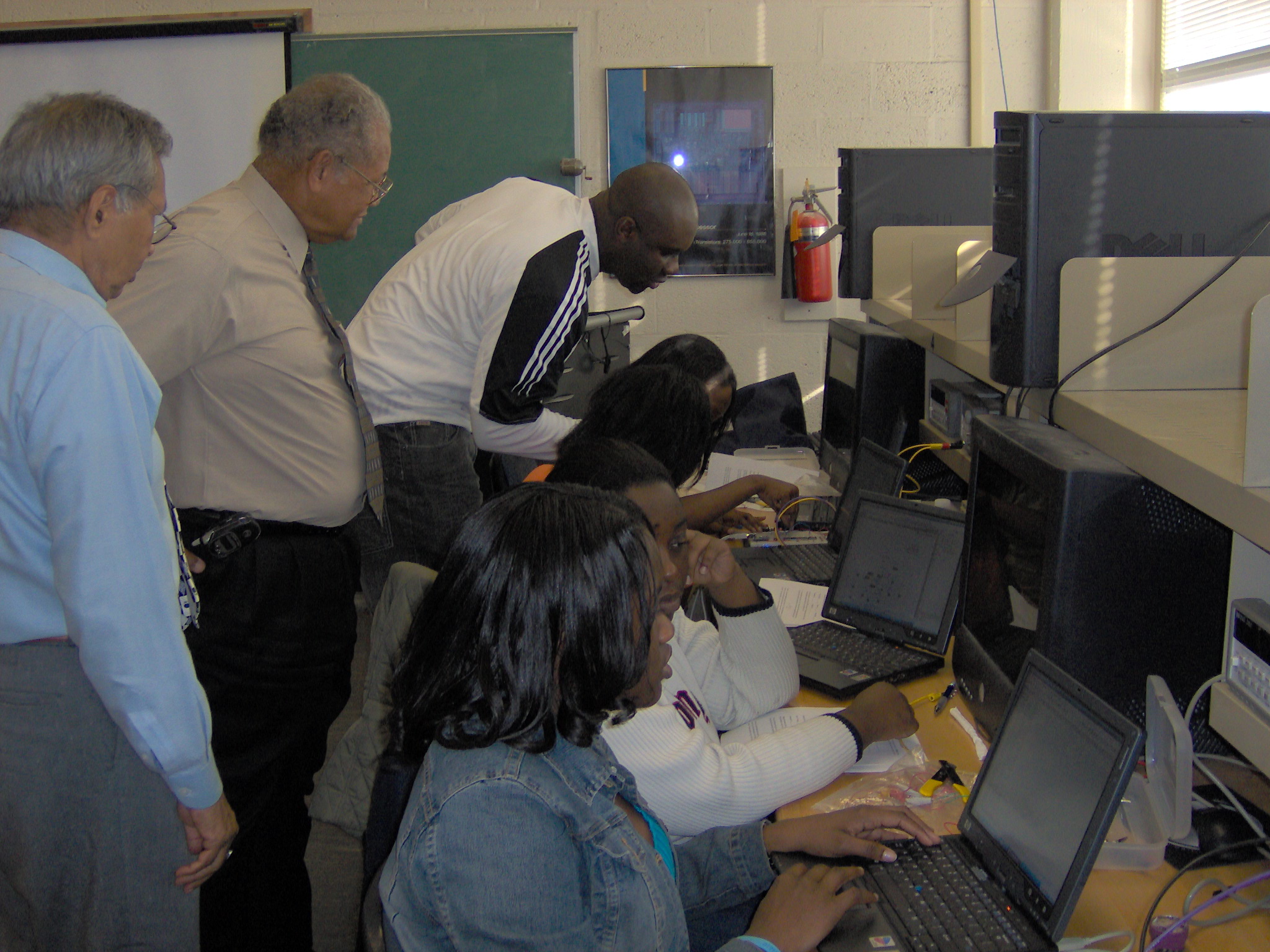
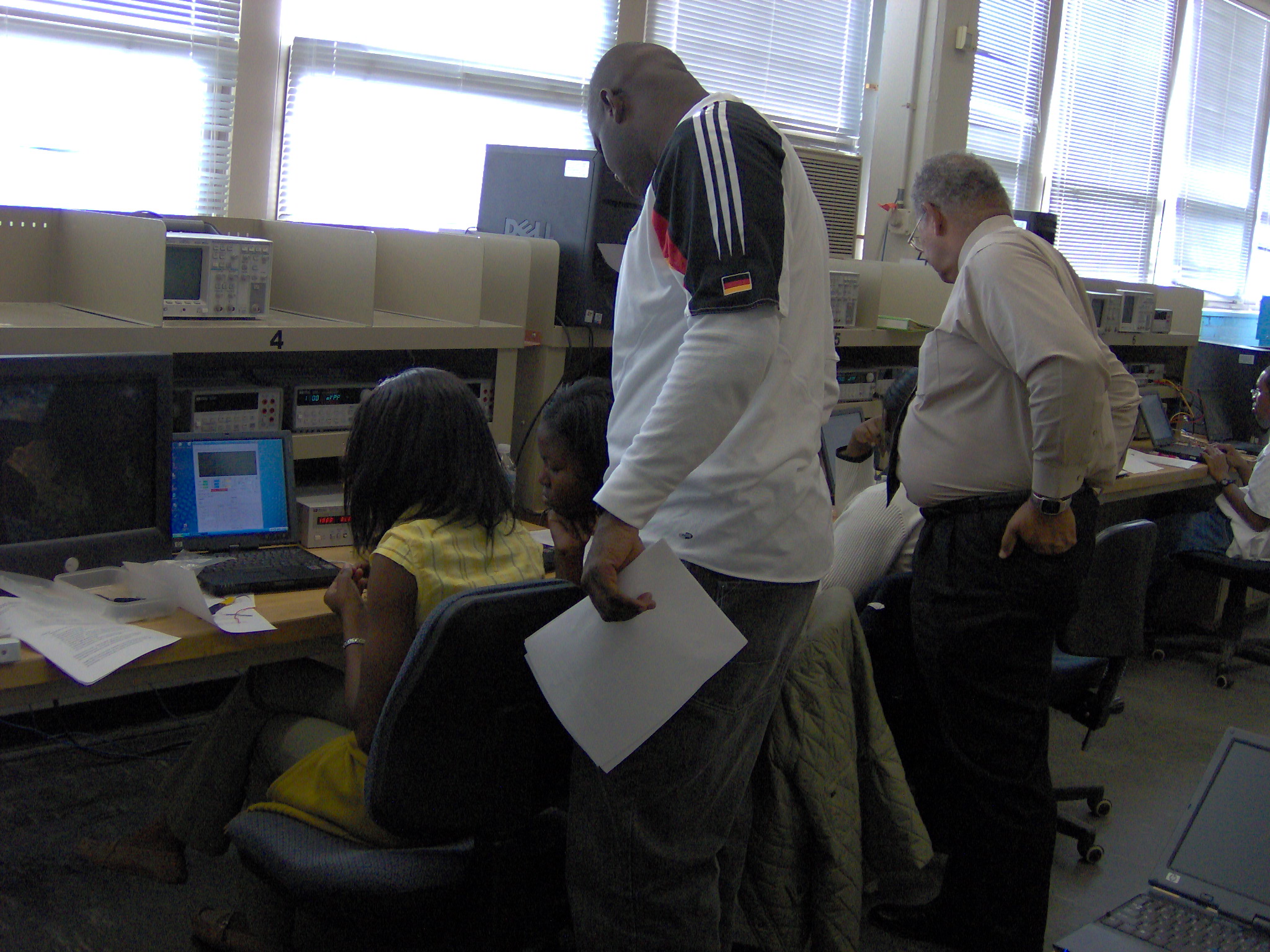
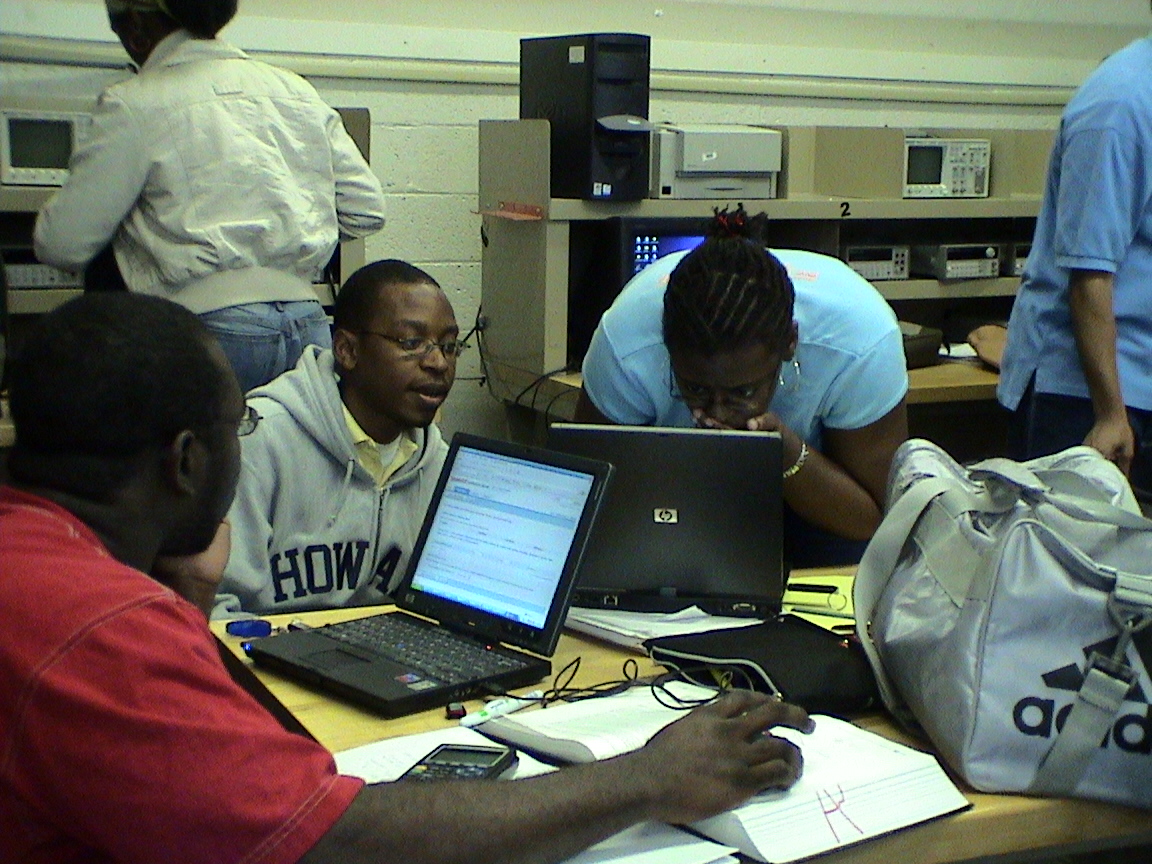
- Dr. Choudhury and Skip Norman (HP)
look on students work with Tablet PCs (Left and
Center). Students under working (Right)
DOCUMENTS
MOBILE STUDIO COMMUNITY
- Link to Initial Mobile Lab Activities Page
- Link to Most Recent Mobile Studio Desktop
Activities
-
- WWW.mwftr.COM
